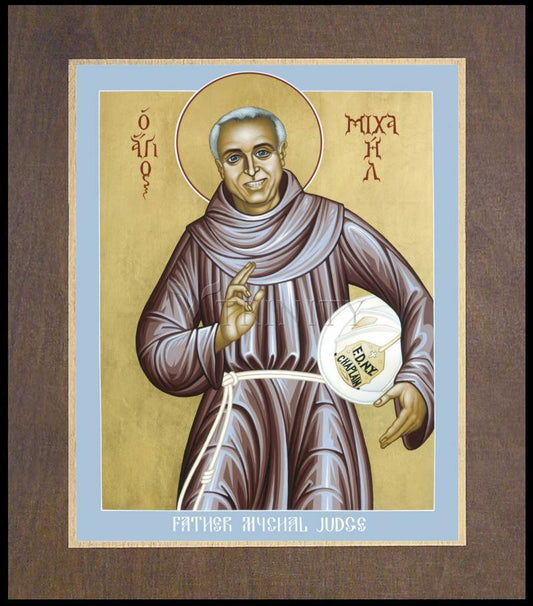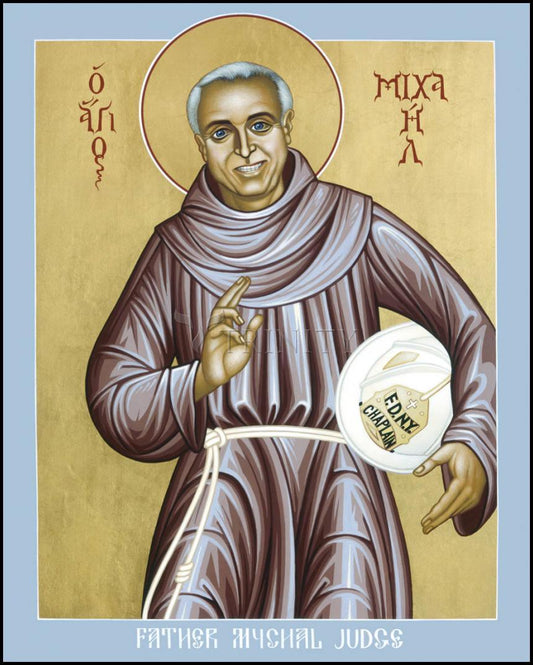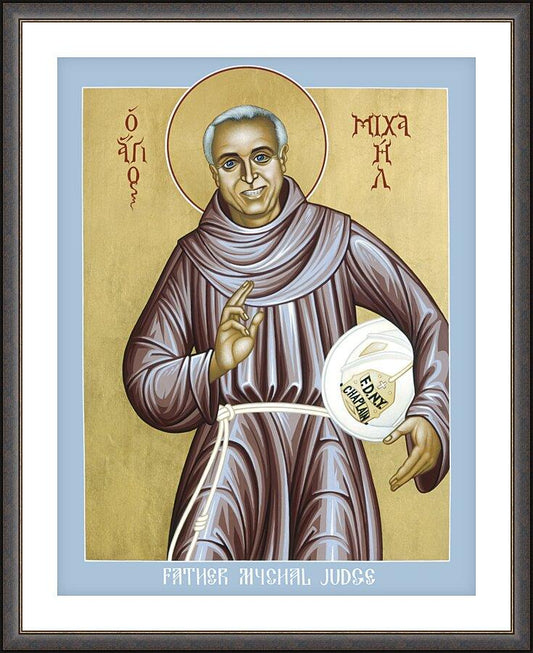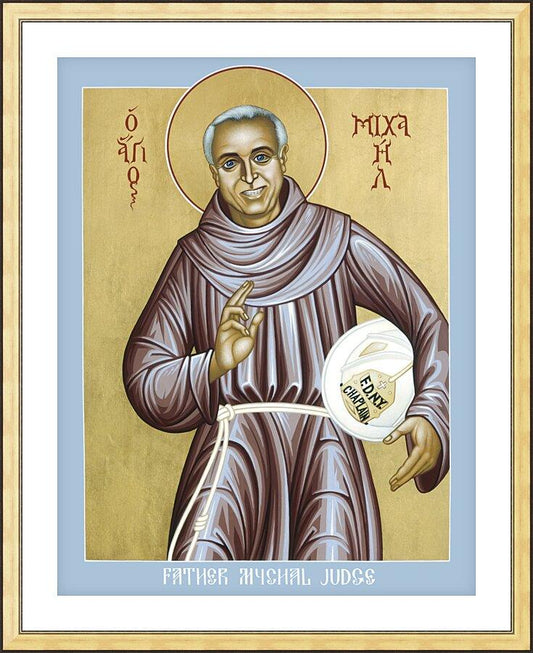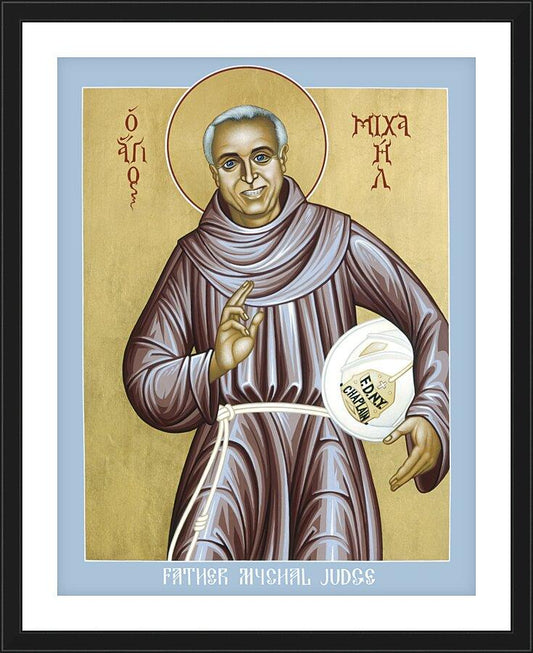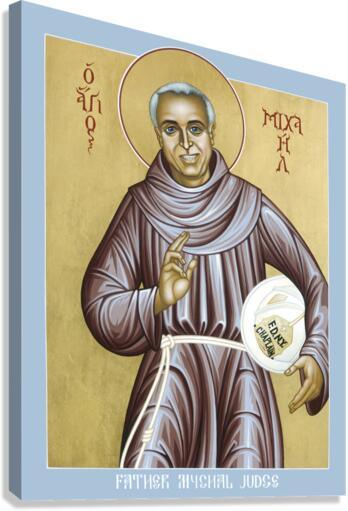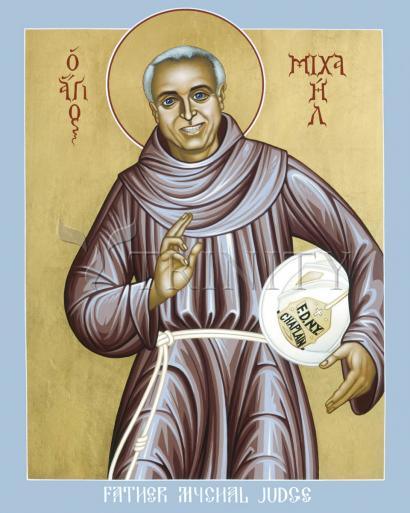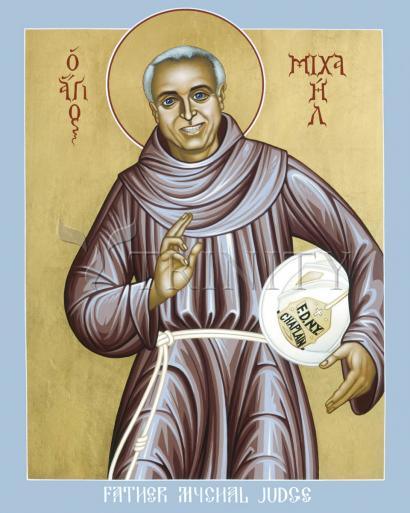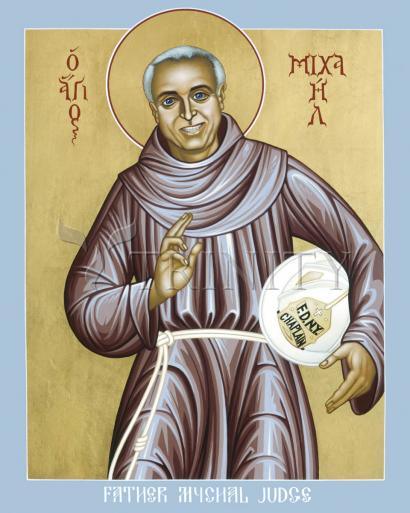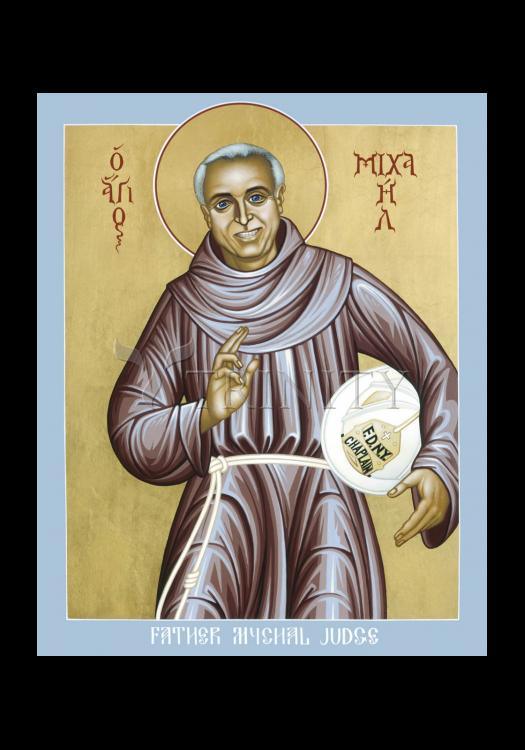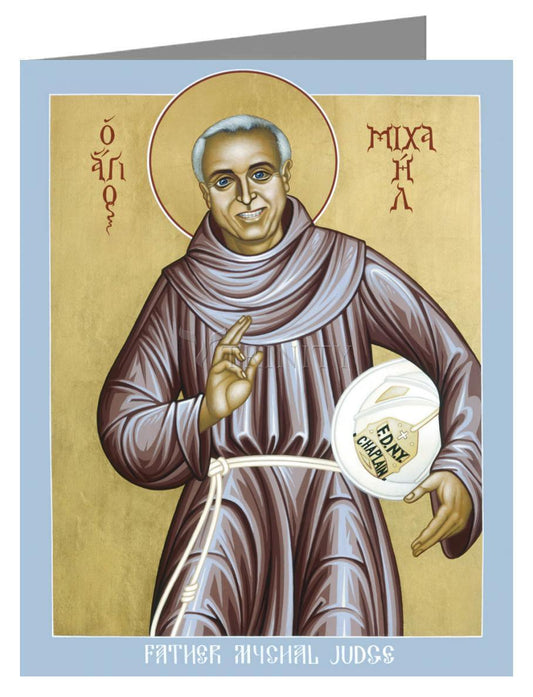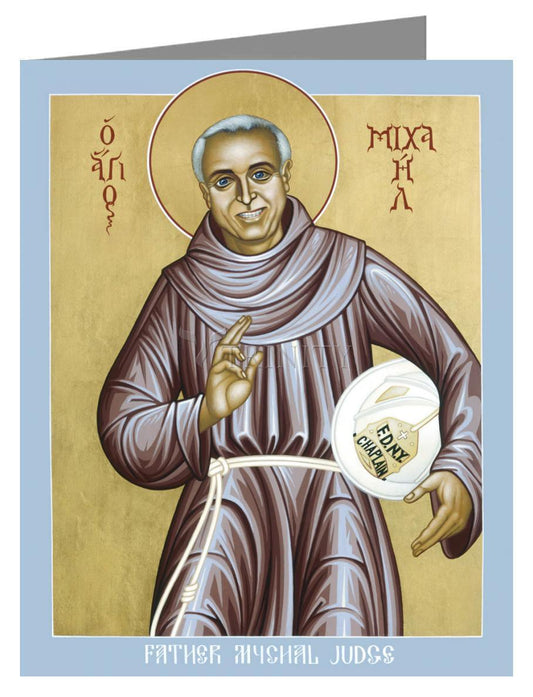"Mychal Judge never built a church or a school,
or raised a lot of money.
What he did was build a kingdom spiritually,
so people feel close to God.
You can't measure that, and you can't see that.
He didn't realize that that was his gift.
But that was evident in the thousands of people
who came out to his wake and to his funeral."
"Father Michael Duffy, Father Mychal Judge's eulogist
"He was a Saint, a wonderful man."
"Rudolph Giuliani
Fr. Mychal Judge died the way he lived, a hero and a saint."
"Rev. Keith A. Fournier, "Common Good"
In his brown Franciscan robe or white firefighter's helmet, Mychal Judge always seemed larger than life. Today, after he became victim No. 00001 of the World Trade Center attack, Father Mychal appears larger than death, too.
The white-haired Fire Department chaplain has emerged from the tragedy of September 11th as a multipurpose icon, claimed as one of their own by constituents throughout the city where he once walked in leather sandals, and now, throughout the world, as a Father Mychal Judge canonization movement gathers steam.
Priests, nuns, lawyers, cops, firefighters, journalists, homeless people, rock 'n' rollers, recovering alcoholics, gay activists, local politicians, people with AIDS, middle-aged couples and young lovers all claim Father Mychal as their own.
But before he died, few realized that this Franciscan friar, with such a high-profile as a chaplain in the New York City Fire Department, moved through so many different orbits -- and touched so many lives.
Father Mike, as he was known, was of course, profoundly mourned by the firefighters he loved as "his boys."
With parents from Ireland who met on the boat, he was much honored in the Irish community.
But there was much more to the life of Father Mychal Judge.
The day of his funeral was the 23rd anniversary of his "recovery" as an alcoholic. He was a staunch believer in the 12-step movement of Alcoholics Anonymous, which he called "America's greatest contribution to spirituality."
Father Mychal was extremely close to New York City police officer Steven McDonald, who was left paralyzed after a shooting, traveling with him, his wife, Patti Ann, and their son, to speaking engagements in the United States and Northern Ireland -- and to Lourdes.
"He was my idea of what a priest should be." "Above all, he was a living example of Jesus Christ."
"Steven McDonald
Father Mychal became the personal pastor to many families of victims of the TWA Flight 800 disaster off Long Island, regardless of their religious affiliation. He spent weeks at a Ramada Inn hotel that became base of operations for the families, and he remained involved in some of their lives until his death at the World Trade Center.
Father Mychal was known for his ministry to those suffering from AIDS, even years back when very few people would go near an AIDS patient.
Father Mychal was a longtime member of Dignity, the gay Catholic group. When his close friend, gay activist Brendan Fay, started a St. Patrick's parade in Queens that included gay groups, Father Judge helped him fund it and showed up in his brown friar's robe to put the church on the side of the oppressed, even as Catholic officialdom was urging a boycott.
In recent years, he "came out" to many of those he loved, including Fire Commissioner Tom Von Essen, who warmly accepted him.
Today, there are tangible signs of his new status:
A stretch of West 31st in Manhattan and a Hudson River ferry were named for Father Mychal Judge.
Pope John Paul II accepted the martyred chaplain's fire helmet from a contingent of city firefighters in the Vatican.
Father Mychal's poster-sized portrait still stands inside the front door of Engine Co. 1/Ladder Co. 24, his local firehouse.
A book on his 68-year life is in the works.
Like St. Francis of Assisi, he wrote a powerful prayer that is being repeated around the world.
A worldwide movement is building to have him declared a saint.
Father Mike is being transformed into St. Mychal.
Who was Father Mychal Judge?
Father Mychal's death certificate listed him as victim No. 00001 -- the first official fatality of the World Trade Center attack.
His friends agree it was the perfect exit for Mychal Judge. But it was just the start of his second life, as one of his fellow priests observed at Father Mychal's funeral Mass.
"I stand in front of you," his friend Father Michael Duffy commented to much laughter, "and honestly feel that the homilist at Mother Teresa's funeral had it easier than I do."
Father Mychal would have appreciated Duffy's crack -- they shared a dry Irish wit.
When the Brooklyn-born Father Mychal actually met Mother Teresa during one of her New York visits, he asked for spiritual advice.
"Pray at least two hours a day," the saintly nun replied.
"Yeah, I will," Father Mychal replied. "But I gotta get to work, you know?"
A typical response from the atypical priest.
Mychal Judge even composed his own prayer, a mix of piety and self-deprecation:
"Lord, take me where you want me to go
Let me meet who you want me to meet
Tell me what you want me to say
And keep me out of your way."
Obviously, Mychal Judge was not what one might call a conventional priest. But he was, arguably, a typical New York Franciscan -- earthy, streetwise, thoroughly engaged with the characters and chaos of the city. If times required it, Father Mychal would hold Mass in the most unlikely places, including firehouses and Pennsylvania Station. This drove certain literalists in the clergy crazy, but no matter -- Father Mychal pressed on.
Father Mychal Judge was gregarious, mischievous, a luminous presence; he thrived on movement and kept a preposterous schedule. On any given evening, he might be baptizing a fireman's child, ministering to an AIDS patient, or listening to Black 47, a Celtic rock band that had a regular gig at Connolly's on West 47th Street. Mychal Judge got 30 to 40 messages a day on his answering machine.
Perhaps the most unusual thing about Mychal Judge was how simultaneously New York and un-New York he seemed. Father Mychal's roots in the city ran deep -- he was born here and raised there -- and he knew everyone, from the homeless to the mayor. Father Mychal loved being at the center of things, loved being in the media glare. His colleagues often teased him about it -- that and his vanity about his thick gray hair, which he was forever combing.
But he lived on an entirely different plane of priorities from that inhabited by most New Yorkers. He was nonacquisitive, unselfish, and uncomplaining.
"Once in a while," Father Duffy said in his homily for Father Mychal, "he would say to me, 'Michael Duffy' -- he always called me by my full name -- 'Michael Duffy, you know what I need?' And I would get excited because it was hard to buy him a present or anything. I said, 'No, what?'
"You know what I really need?"
"No, what, Mike?"
"Absolutely nothing. I don't need a thing in the world. I am the happiest man on the face of the earth."
The Making of Father Mychal Judge
He was born Emmet Judge in Brooklyn, New York on May 11, 1933, two days before his twin sister, Dympna. His parents were Irish immigrants from County Leitrim; his father owned a grocery store on Dean Street. Mychal was six when he watched his father die after a long illness. To help his mother and two sisters make ends meet, he shined shoes at Penn Station (in the vicinity of St. Francis Church), ran errands and did odd jobs.
According to Dympna, Mychal Judge always wanted to be a priest. He was an altar boy in elementary school and joined the Franciscan friars when he was just 15. He took vows of poverty, chastity, and obedience in 1955, and was ordained in 1961.
Mychal Judge would serve as pastor of two New Jersey parishes named after St. Joseph: one in East Rutherford, another in West Milford. Before his West Milford assignment, he also served at Sacred Heart in Rochelle Park, New Jersey. Between parish assignments, he served as assistant to the president at Siena College in Loudonville, New York.
Father Judge was pastor in West Milford during what was described by The Bergen County Record as perhaps the most trying times in the town's history. In a few years' period, five teens had committed suicide and two others had died in alcohol-related accidents.
Father Judge reached into his own experience of suffering and told people, according to the Record, "When tragedies strike us at any early age, maybe religion takes on a greater meaning. The closer the tragedy is to our heart and home, the more likely faith is to form, because we've been tested and tried, and from that comes faith."
Even during his New Jersey years, his love of firefighting was evident: "He was a real fire buff" who loved firefighters and their jobs, according to the Paterson, New Jersey, fire chief.
His eulogist Father Michael Duffy, recalled a time in East Rutherford, when Father Judge stepped into the fray.
"I remember once I came back to the friary and the secretary told me, 'There's a hostage situation in Carlstadt and Mychal Judge is up there.' So, I said, "Oh, gosh." Well, I got in the car "¦ drove up there."
"There was a house and there was a man on the second floor with a gun pointed to his wife's head and the baby in her arms," Father Duffy said. "And he was threatening to kill her. When I got there, there were several people around, lights, policemen and a fire truck. And where was Mychal Judge? Up on the ladder in his habit, on the top of the ladder, talking to the man through the window of the second floor. I nearly died because in one hand he had his habit out like this, because he didn't want to trip. So, he was hanging on the ladder with one hand. He wasn't very dexterous, anyway. I was fearful and he was, you know, his head bobbing like, 'Well, you know, John, maybe we can work this out. You know, this really isn't the way to do it. Why don't you come downstairs, and we'll have a cup of coffee and talk this thing over?'"
"I was there, we're all there, saying, 'He's going to fall off the ladder. There's going to be a gunplay.' Not one ounce of fear did he show. But he was telling him, 'You know, you're a good man, John. You don't need to do this.' Sure enough, the man put the gun down and the wife and the baby's lives were saved. We expected to hear a gunshot, but it all turned out peacefully."
That's how he was, said Duffy: "He inserted himself right where the action was, and then he would somehow bring about peace."
Did he have nerves of steel? "Sometimes I think he didn't know any better," Duffy said with a laugh. "He probably didn't even realize that he was the one who could get hurt! He just saw the need, and that's what drove him."
In 1986, he was assigned to the friary at St. Francis of Assisi Church on West 31st Street in Manhattan.
Steven McDonald
Father Judge was newly assigned to Manhattan, when he was called to Bellevue Hospital to say Mass for New York City police officer Steven McDonald.
McDonald was left paralyzed from the neck down after being shot by a 15-year-old he was questioning in Central Park. At the time, Detective McDonald's wife, Patti Ann, was carrying their first child, a son, whom they would name Conor.
"When I first saw him, he was just lying in bed, motionless," Father Judge told a reporter. "He was in bad shape, but determined to live."
In the days and years following the shooting, Father Judge became extremely close to McDonald, Patti Ann and Conor. The priest had the opportunity to travel with McDonald during a number of speaking engagements in the United States and Northern Ireland.
He also accompanied the ex-cop on two pilgrimages to Lourdes.
"They were, as my dear mother says, 'two peas in a pod,' Steven and 'Father Mike,' wrote Keith Fournier, founder of the Catholic group, Common Good. Two Irish men with smiling eyes, a love for Ireland (and America) and hearts full of laughter. Father Mychal loved Steven. He knew that though racked with constant pain, Steven had found the path to peace and the balm of the Saints."
"He pushed Steven's wheel chair with both gratitude and a dignity that one had to experience because words cannot express the beauty. Steven loved Father Mike. Theirs was a friendship unlike any I had experienced."
FDNY
Father Mychal Judge became a fire chaplain in 1992, after his predecessor, another friar at Assisi, died of cancer
"I always wanted to be a priest or a fireman; now I'm both," Father Mychal told John Zawadzinski. "I had to bust my tail to get this habit, so I wear it always. I wanted to be a Franciscan so bad. I have absolutely no regrets." (He did, for safety, wear a chaplain's uniform when he was on duty for the fire department.)
His first priority was always the Fire Department, which kept him in the loop by beeper and radio. If there was a fire of three alarms or more -- beep, beep, beep -- off he'd go, in a large sedan the men kept for him at Engine 1-Ladder 24.
"Most of his life," says Christopher Keenan, "he lived with a great deal of stress about what he couldn't respond to -- the times he had to say no." Two months before he died, Father Mychal had changed the message on his answering machine. "This is Mychal Judge," he said. "It's so good to get your call. But if you're calling about a wedding or a baptism or funeral, I am so sorry, but I will not be able to do it, because my primary commitment is to the Fire Department."
By nine or ten at night, he would return to his spartan room and spend the next three or four hours on the phone, returning calls, touching base, making sure that the batty shut-in in New Jersey was surviving or that the homeless person he'd found housing for had figured out how to hook up her telephone. He'd write in his journal. And he'd write letters -- Carroll calls them his "midnight notes" -- to the friends he'd seen that day or the people he was most concerned about. (He made a special point of keeping the letters coming to David Dinkins, especially when the former mayor was going through a rough spell.)
Some nights, he'd conclude with a 1 a.m. phone call to the men at Engine 1-Ladder 24. As soon as a firefighter picked up, Father Mychal would wander over to his window, facing south over 31st Street, and wave.
9/11
On September 10, 2001, less than 24 hours before he died, Father Mychal Judge happened to rededicate Chief Von Essen's old firehouse in the Bronx. The department has the ceremony on videotape.
"Good days, bad days," says Father Mychal, clad in a bright white robe. "But never a boring day on this job. You do what God has called you to do. You show up, you put one foot in front of the other, and you do your job, which is a mystery and a surprise. You have no idea, when you get in that rig, what God is calling you to. But he needs you"¦ so keep going. Keep supporting each other. Be kind to each other. Love each other. Work together. You love the job. We all do. What a blessing that is."
It was about 8:50 a.m. on Sept. 11 when word reached West 31st Street about the tragedy in lower Manhattan. The thick, black smoke was already billowing skyward. At Engine Co. 1/Ladder Co. 24, the firefighters climbed into their gear and headed downtown.
Across the street at the Church of St. Francis of Assisi, Mychal Judge did the same.
Fellow Franciscan Father Brian Carroll went up to Father Mychal's room to inform him that a plane had just crashed into one of the World Trade Center towers. Father Carroll recalls that Father Mychal quickly took off his Franciscan habit, changed into his chaplain's uniform -- paused to comb and spray his hair -- and headed for the door. The trip from the firehouse to the friars' residence is maybe two dozen steps. It was a trip that Father Mike -- as he was known among both the homeless and the famous -- made many times since becoming FDNY chaplain in 1992.
This morning, as thousands of New Yorkers ran for their lives toward midtown, Mychal Judge jumped in his Fire Department car. With firefighter Michael Weinberg at the wheel and the siren wailing, they sped downtown toward the World Trade Center. He arrived at the burning 110-story towers, where Mayor Rudolph W. Giuliani spotted him.
"Mayor Giuliani recalls that they were both down there very early in the event and the mayor saw him run by with the firemen," says Father Michael Duffy. "Giuliani says he grabbed his arm and stopped the friar, saying, 'Mychal, please pray for us.' And Mychal just looked at him with a big grin and said, 'I always do!' And then he turned and ran off with his firefighters, right to the tower, and that's where he died."
"Excerpts from The Life of Father Mychal Judge



